Project 1 Desk Calculator
Chapter 1:
Introduction
This time our task is to write a program that imitates a simple desk
calculator .Our calculator can accept an infix expression which includes
(, ), +, -, *, /, % and ^(exp exponentiation operator, a^b= a
b
).
Our program reads test cases from a file “input.txt”. In the file there
are several test cases, each occupies one line that contains an infix
expression. Proceed until the end of the file. And for each test case,
output to a file “output.txt” in one line the value of that expression
(accurate up to two decimal places), or an error message “ERROR IN
INFIX NOTATION”.
Chapter 2: Algorithm Specification
Main Frame
Begin
Try {
}
End
Input (input: string);
Infix to Postfix (input: string, output: array of double);
Calculate (input: array of double, output: double);
Output (output: double);
�
Infix to Postfix
Begin
Try {
Switch (one char of the string) {
Case ‘0’-‘9’or ‘.’:
double);
Write into output
Break;
Case operator except ‘)’:
Check next until get a char is not in {‘0’-9’,’.’};
String to Double (input: all the chars read, output:
Check the stack, if it’s not empty; pop all the
operators of the high priority and write into output;
Break;
Pop and write until meets a ‘(‘
Case ‘)’:
Default: throw error;
}
Pop all the operators left in the stack and write into output;
Calculate
Begin
Try {
Switch (one char of the string) {
Case operand:
Push into stack;
Break;
Case operator:
Calculate and push the result into stack;
Break;
Default: throw error;
}
Return the top of the stack (result);
}
}
End
Error Processing
Caught (Error)
Begin
End
Process (Error);
�
Chapter 3: Testing Results
Test table
Single
Input
No. Test sort
1
2
3
4
5
6
7
8
9
10
11
12
13
BadCase
Input
14
Several
Inputs
Test case(Input)
4.99+5.99+6.99*1.06
(3*5*(4+8)%2)
2^2^3
1+2(
2/0
(2-4)^3.1
2.5%2
2%2.5
4.49
*-*-
9*5 +8 -3^ 3
^^^^
4.49
4.99+5.99+6.99*1.06
(3*5*(4+8)%2)
2^2^3
1+2(
2/0
(2-4)^3.1
2.5%2
2%2.5
Current status
correct
correct
correct
correct
correct
correct
correct
correct
correct
correct
correct
correct
correct
correct
Test result(Output)
the result is 18.389400
the result is 0.000000
the result is 256.000000
input error!
error: zero divisor
error : ^ need integer !
error : % need integer !
error : % need integer !
the result is 4.490000
error: zero divisor
the result is 26.000000
input error!
the result is 4.490000
The result is 18.389400
the result is 0.000000
the result is 256.000000
input error!
error: zero divisor
error : ^ need integer !
error : % need integer !
error : % need integer !
Chapter 4: Analysis and Comments
1. Analysis
1.) Test
We just set three sorts of inputs. The first is Single Input, which
can judge weather the program give the right answer to each kinds of
calculate as expected. The second is bad case input ,which can test
weather the program can analysis these kinds of errors. The third is
several inputs, which can test the corporation of the algorithm inside the
program.
�
2.)Running time
a.) Input (iuput: string)
This Algorithm runs in O (N) time.
It reads N characters or digitals from “input.txt”. This algorithm only count
b times per character or digital into “input.txt”. (b is a constant
interger.)This algorithm only count one time per character or digital and a
total of bN units. Adding some constant units k that takes time at the
beginning and the end of the algorithm, it counts for a total of bN+k units.
Above all, the function runs in O (N) time.
b.)Calculate (input: array of double, output: double)
This Algorithm runs in O (N) time.
This algorithm counts b times for each character or digital stored in array
by Input (iuput: string) and a tatal of bN units. Adding k units of constant
common use, it counts for a total of bN+k units. Above all, the function
runs in O (N) time.
c.) output (output: string)
This Algorithm runs in O (N) time.
It outputs N characters or digitals into “output.txt”. This algorithm only
count b times per character or digital into “input.txt”. (b is a constant
interger.)This algorithm only count one time per character or digital and a
total of bN units. Adding some constant units k that takes time at the
beginning and the end of the algorithm, it counts for a total of bN+k units.
Above all, the function runs in O (N) time.
In a word, the total program runs in O (N) time.
2. Comments
After some tests and improvement, this program runs well as
expected. It gives the proper data that are required in the document.
So the program is correct after all. However,there were still some
problems . We also have many things to be improved such as the
�
wrong judge when we type an “enter” at the last line in the
“input .txt” .(Fortunately, this bug has been removed from the final
program.) And we can add complex number to be calculated to make
this project more useful and perfect later. Also , this program can be
optimized . If we have more time, I think we can make it much better.
From this project, we can have a deep understanding about how to
write a file by a c program. Also ,we have seen the importance of a
good type of data structure, which can make the program more clearly
and can be helpful for debugging and reading. It is quiet important for
us to choose the best algorithm in any situation.
�
-----------------------------------------------------------------------------------
Appendix: Source Code (in C)
/* Build with Visual C++ */
1.main.c
# include "del.h"
void push (double element, double v[]);
double pop(double v[]);
int sp = 0;
double val[MAXVAL];
int main()
{
char type;
double numb;
double op2, op3, sum;
int i,k;
FILE *fpw2;
fpw2=fopen("output.txt","w+");
if((k = itop())==-1) /*judge wheter it's an correct return*/
{ fprintf(fpw2,"input error!\n");
}
do{ /*do-while loop move the calculations to the next line*/
for(i = 0; i
{ fprintf(fpw2,"error: zero divisor\n");
goto tmpend;
}
break;
case '%' :
op2 = pop(val);
op3 = pop(val);
push( ((int)op3 %(int) op2), val);
else
{ fprintf(fpw2,"error : %% need integer !\n");
goto tmpend;
}
break;
case '^' :
op2 = pop(val);
if(isint(op2) && isint(op3))
op3 = pop(val);
if(isint(op2))
{ sum = pow(op3,op2);
push(sum, val);
}
else
{ fprintf(fpw2,"error : ^ need integer !\n");
goto tmpend;
}
break;
}
fprintf(fpw2,"the result is %.2f\n",pop(val));
tmpend:; /*if input error or calc error has occured,it jumps here*/
if(!feof(fp))
{
goto tmpend;
}
else
break; /*input file ends*/
}while(1);
fclose(fp);
fclose(fpw2);
return 0;
}
void push(double element, double v[])
{
if (sp < MAXVAL)
v[sp++] = element;
else
default :
fprintf( fpw2 , "input error!\n");
goto tmpend;
}
}
if((k = itop())==-1) /*and move to the next line*/
{ fprintf(fpw2,"input error!\n");
}
if(k==0)
return 0; /*the input is nothing*/
�
printf( "error: stack full, can't push %g\n", element);
}
double pop(double v[])
{
if ( sp > 0)
return v[--sp];
else {
printf( "error: stack empty\n" );
return 0.0;
}
}
2. ItoP.H
# ifndef del_h
# define del_h
#include
#include
#include
#include
# define MAXLEN 100
# define MAXVAL 100
FILE *fp; /*fp point to input.txt*/
int flagfp=1; /*a flag to avoid reopening the input.txt*/
struct Node
{
int flag; /*1 indicates the type is number,and 2 sign*/
double Number;
char Sign;
} Data[MAXLEN]; /*to save all datas*/
int isint(double a) /*to judge whether the original input is interger*/
{ if(fabs(a-(int)a)<1.0e-5)
return 1;
return 0;
}
int itop() /*hanle the input.txt,get its data of line in Data[]*/
{
char ch;
int i = 0 , t = 0, top = 0;
char stack[MAXLEN];/*temporary stack,save signs like + - / and * ^ */
char v[MAXLEN]; /*save the data one by one from input.txt*/
if(flagfp && (fp=fopen("input.txt","r"))==NULL)
{
goto end;
}
flagfp=0;/*indicates that input.txt has been opened*/
ch=fgetc(fp);
do
{
if( isdigit(ch) || ch == '.') { /*handle digits*/
do {
�

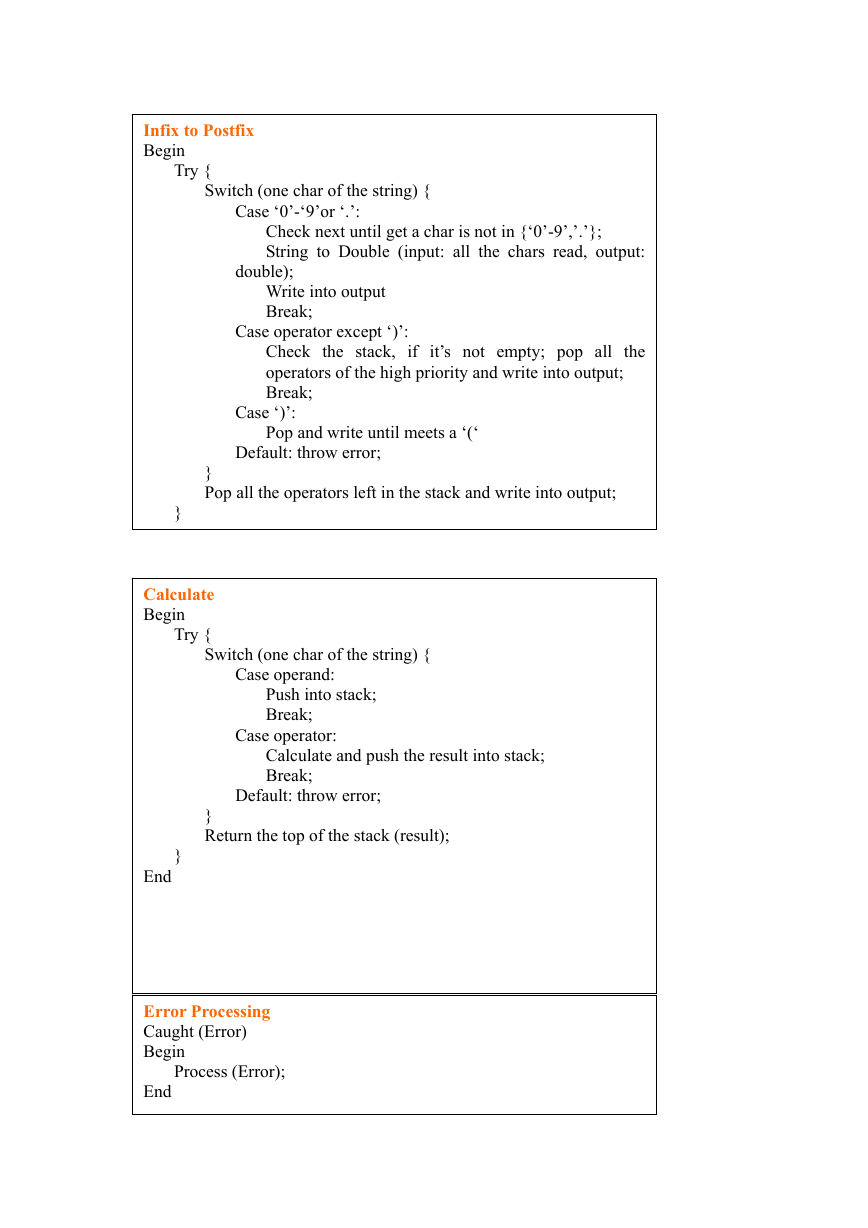
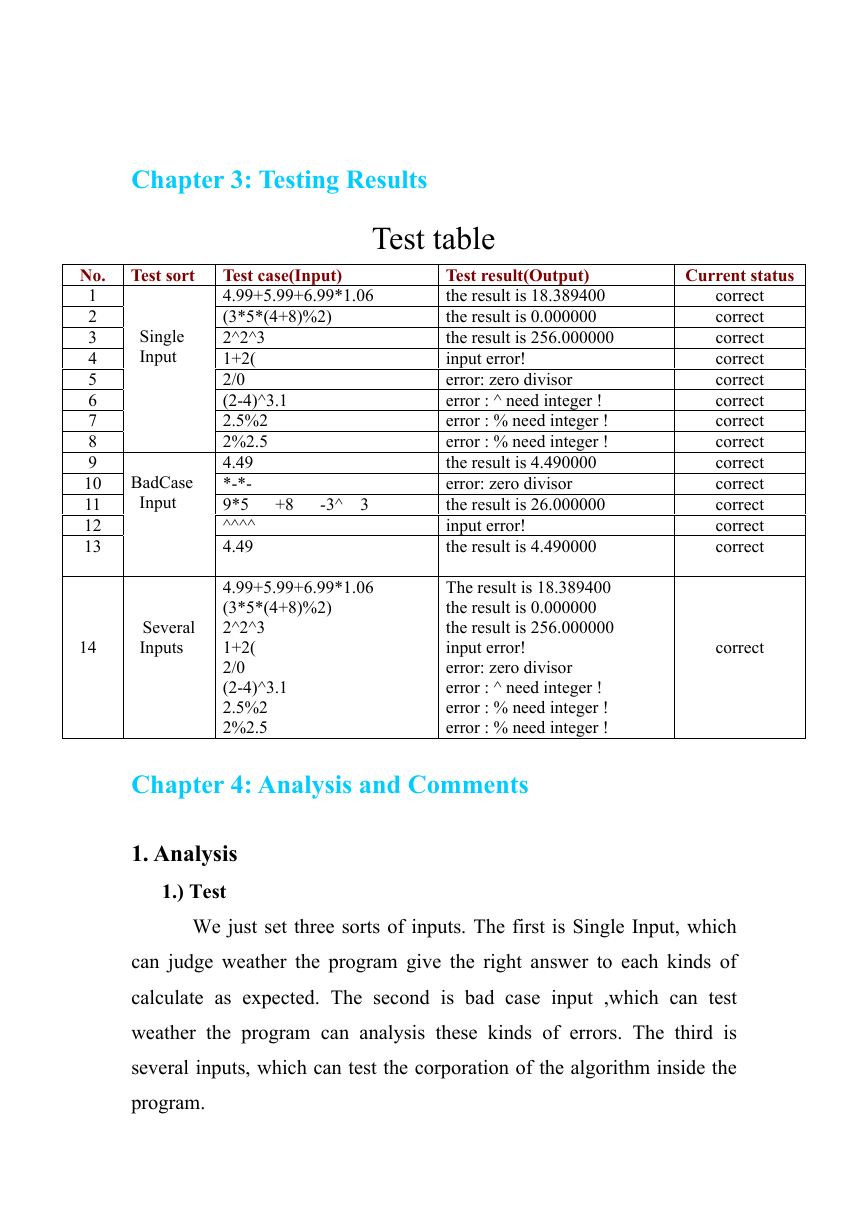
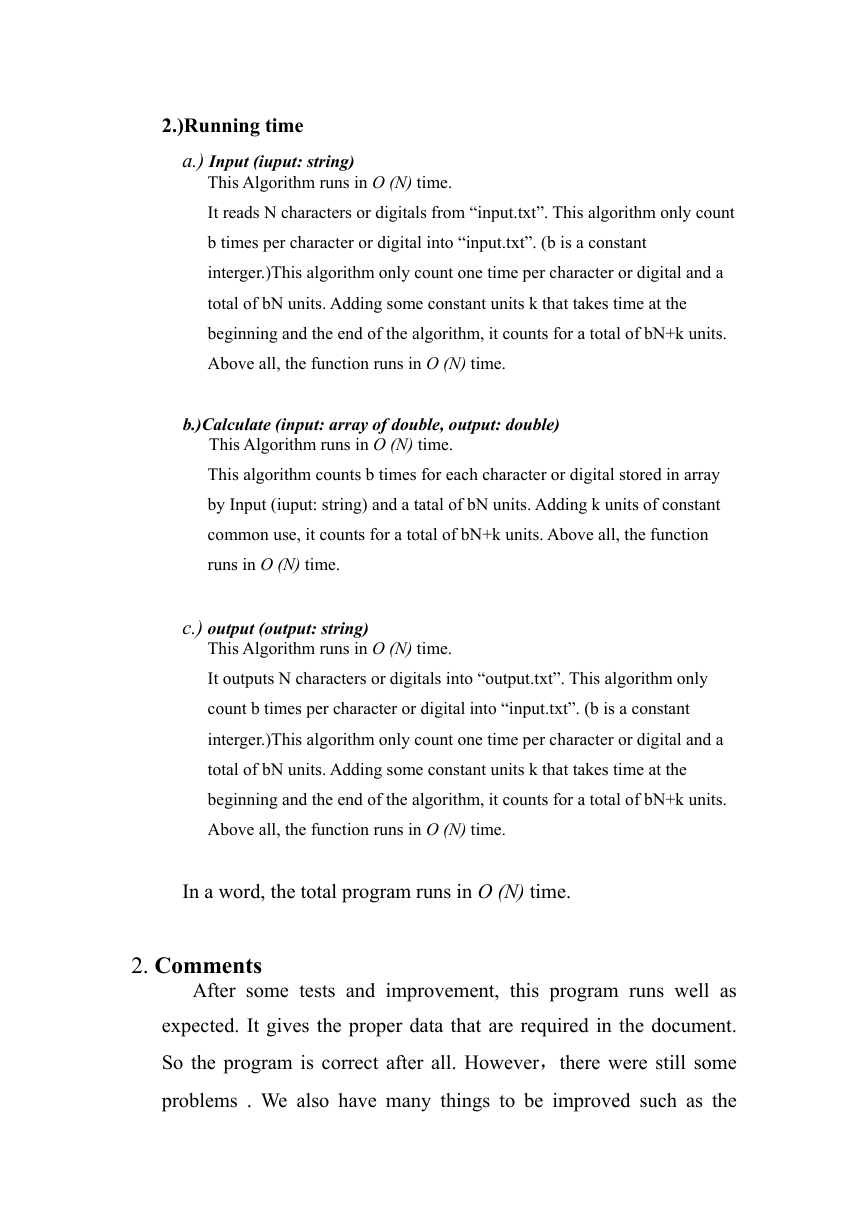
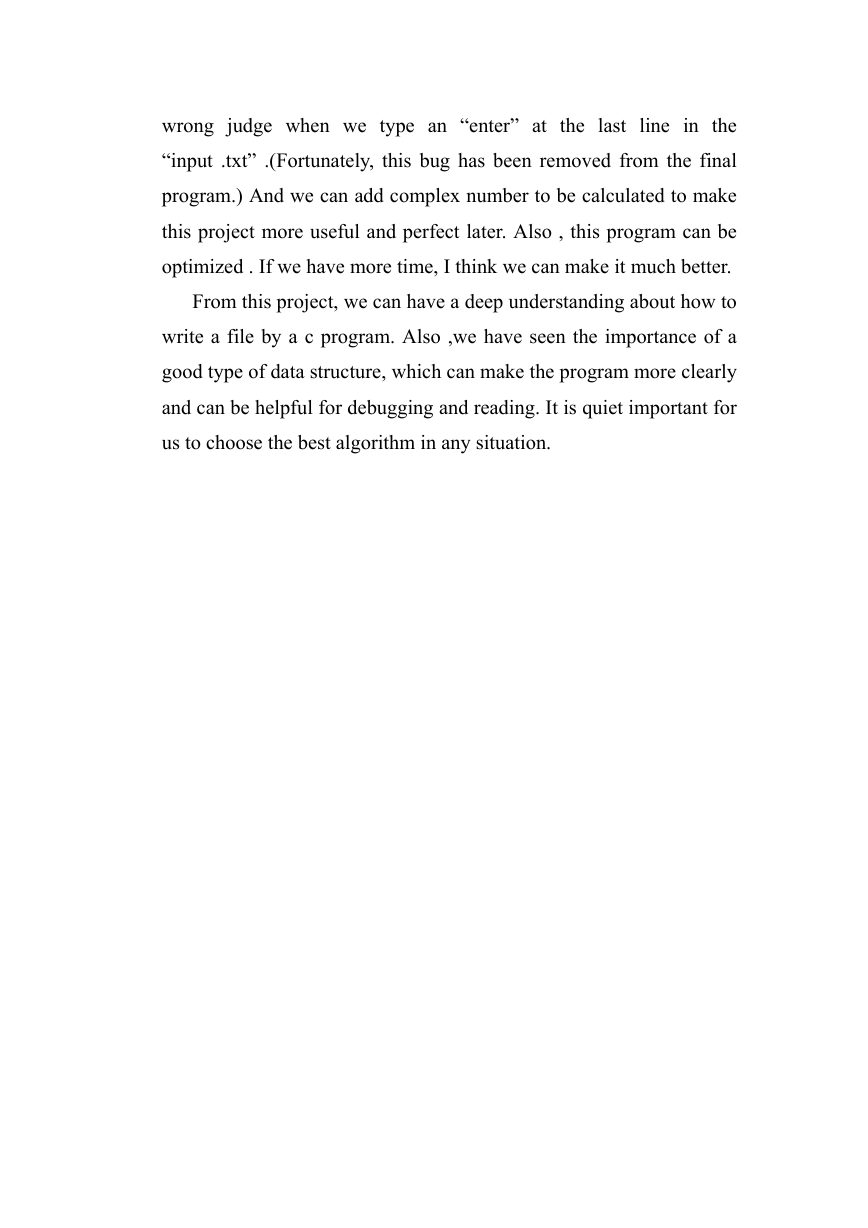
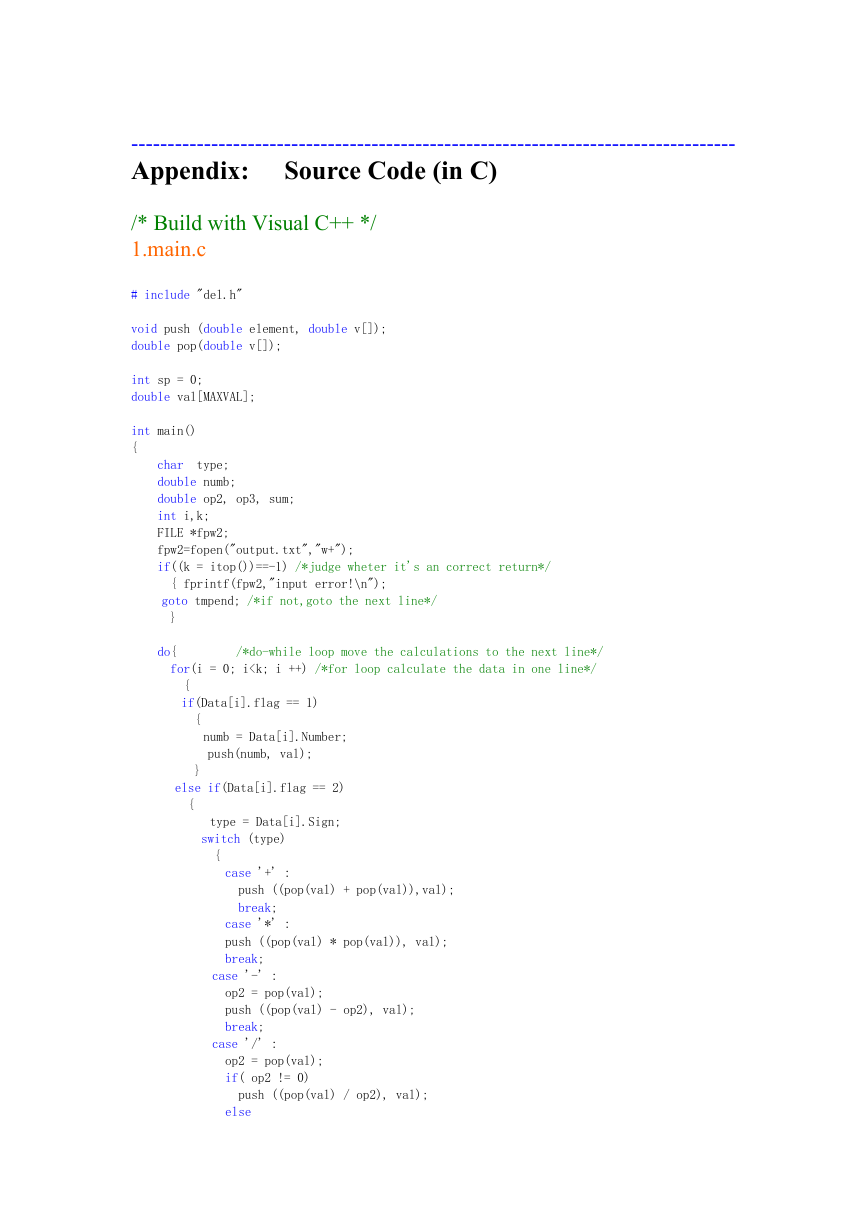
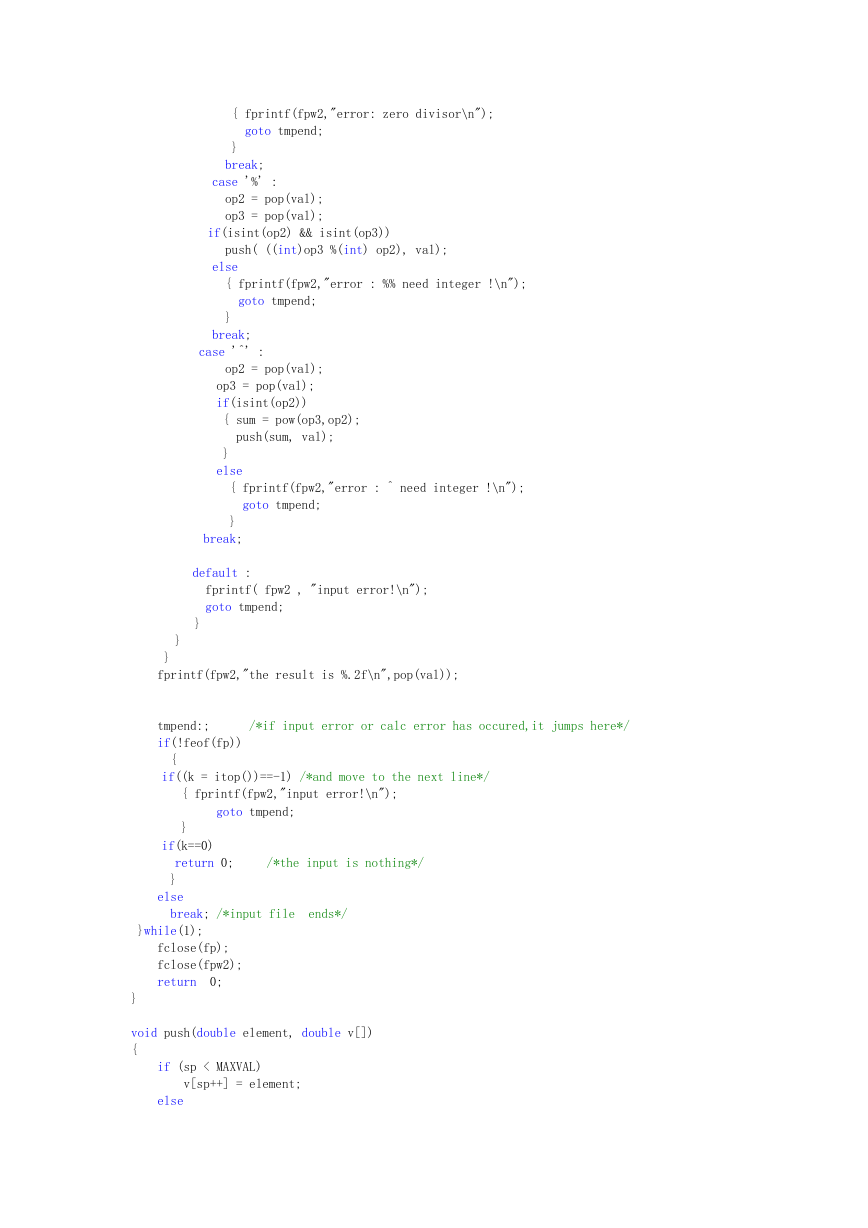
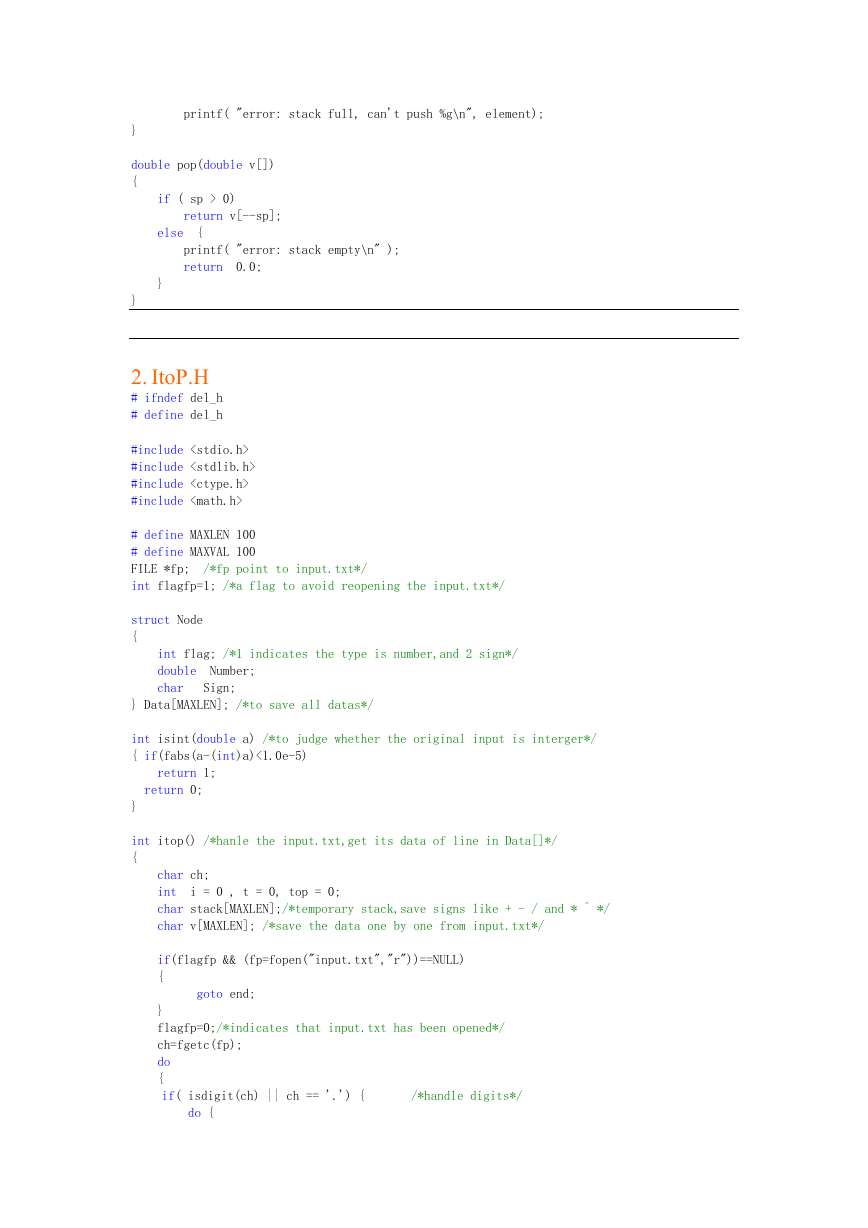








 2023年江西萍乡中考道德与法治真题及答案.doc
2023年江西萍乡中考道德与法治真题及答案.doc 2012年重庆南川中考生物真题及答案.doc
2012年重庆南川中考生物真题及答案.doc 2013年江西师范大学地理学综合及文艺理论基础考研真题.doc
2013年江西师范大学地理学综合及文艺理论基础考研真题.doc 2020年四川甘孜小升初语文真题及答案I卷.doc
2020年四川甘孜小升初语文真题及答案I卷.doc 2020年注册岩土工程师专业基础考试真题及答案.doc
2020年注册岩土工程师专业基础考试真题及答案.doc 2023-2024学年福建省厦门市九年级上学期数学月考试题及答案.doc
2023-2024学年福建省厦门市九年级上学期数学月考试题及答案.doc 2021-2022学年辽宁省沈阳市大东区九年级上学期语文期末试题及答案.doc
2021-2022学年辽宁省沈阳市大东区九年级上学期语文期末试题及答案.doc 2022-2023学年北京东城区初三第一学期物理期末试卷及答案.doc
2022-2023学年北京东城区初三第一学期物理期末试卷及答案.doc 2018上半年江西教师资格初中地理学科知识与教学能力真题及答案.doc
2018上半年江西教师资格初中地理学科知识与教学能力真题及答案.doc 2012年河北国家公务员申论考试真题及答案-省级.doc
2012年河北国家公务员申论考试真题及答案-省级.doc 2020-2021学年江苏省扬州市江都区邵樊片九年级上学期数学第一次质量检测试题及答案.doc
2020-2021学年江苏省扬州市江都区邵樊片九年级上学期数学第一次质量检测试题及答案.doc 2022下半年黑龙江教师资格证中学综合素质真题及答案.doc
2022下半年黑龙江教师资格证中学综合素质真题及答案.doc